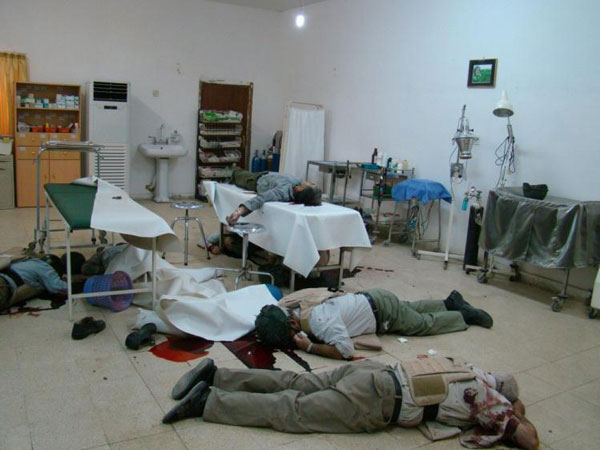
September 06-13
A violent clash at Camp Ashraf Sunday killed half of the 100 Mojahedin-e Khalq members remaining at the camp.
The Mojahedin-e Khalq blamed the Iraqi government, saying it had attacked the camp. The Iraqi government blamed the Mojahedin, saying the dead were the result of infighting.
Both the Iraqi government and the United Nations launched investigations into what happened at Ashraf.
A UN team said it visited Ashraf Monday and found 52 corpses. The Mojahedin also said 52 of its members had been killed. It said another 42 survived and nine of the 103 residents of the camp were missing.
The bulk of the Mojahedin members in Iraq—about 3,300 persons—were moved from Camp Ashraf earlier this year to Camp Hurriya, a former US Army base near Baghdad.
Hurriya is run by the Iraqi government but has a large UN presence as the residents are supposedly being processed by the UN High Commissioner for Refugees (UNHCR) for transfer to asylum in other countries. Only 162 have been moved abroad so far, however.
The other 103 members stayed at Ashraf, reportedly to care for the group’s remaining gear and to prepare for closure of Ashraf. There is no UN continuing presence at Ashraf.
The Iraqi government wants the vast land area that comprises Ashraf to be turned over to Iraqi families and has insisted that the Mojahedin residents leave.
There is no agreement on what happened at Ashraf, other than the fact that 52 of the residents are now dead.
The Mojahedin say that several mortar shells were fired Sunday morning into the camp and that was followed by an invasion by Iraqi Army troops who had been stationed just outside the camp. The Mojahedin say the Iraqi troops proceeded to massacre the group’s members and set fire to the group’s property.
It released pictures showing bloodied bodies lying all around the camp’s medical clinic. It also released a photo showing a row of bodies with their hands tied behind their backs, suggesting they had been killed after being captured. Mojahedin members said the attacks lasted roughly 12 hours from 5 a.m. until late afternoon.
Iraqi Army officers told reporters there were some explosions heard from inside the camp at dawn Sunday. They said the explosions could have come from mortars or from exploding oil or gas tanks. Later, they said, members of the Mojahedin emerged from the camp and attacked the Iraqi troops at a guard post just outside the camp. The officers said they repelled the attack. They said the dead were inside the camp. (There were contradictory news reports quoting Iraqi troops on whether any Mojahedin were killed in the reported storming of the guard post.)
Ali Al-Moussawi, a spokesman for the Iraqi prime minister, said a preliminary investigation suggested all the victims died inside the camp as a result of infighting among the Mojahedin members.
One Iraqi officer also said searchers had found a “huge” amount of explosives planted inside cars, houses and heavy machinery.
Iraqi military officers talking to the media insisted Iraqi troops did not attack the camp, but a police officer, who asked not to be quoted by name, told the Associated Press the troops had raided the camp. “Not a single soldier entered Camp Ashraf,” said Haqi Ash-Sharifi, an Iraqi civilian official tasked with overseeing the camp.
Local hospitals contacted by Agence France Presse said they were treating three wounded Iraqi soldiers and had the bodies of two others.
In Paris, Maryam Rajavi, the co-leader of the Mojahedin-e Khalq, said the United States should either transfer all the residents of the two camps to the United States or the UN should station UN troops inside both camps. (There are no UN troops in Iraq.)
Her statement said the attack on Camp Ashraf was ordered by Iranian Gen. Qasem Soleymani, the commander of Iran’s Qods Force, in an “instruction” sent August 27 to Iraqi Prime Minister Nuri Al-Maliki.
Maliki’s office issued a statement saying, “The Iraqi government stresses the need for help to deport elements of the Mojahedin-e Khalq who are on Iraqi soil illegally, but at the same time confirms its commitment to the safety of those on its territory.” The US military pressed Maliki before it left Iraq and had Iraqi officials make repeated public statements that under international law no Mojahedin member could be expelled from Iraq or sent to another country against his or her wishes.
The United Nations, the United States and Amnesty International have all condemned Sunday’s bloodshed at Ashraf. But they have all avoided attributing blame for the deaths, indicating suspicions about the truthfulness of both the Iraqi Army officers and the Mojahedin-e Khalq.
The UN said it would probably issue a report on its investigation at Ashraf later this week, after the Iran Times had gone to press.
Earlier this year, there were two mortar attacks on Camp Hurriya, near Baghdad. At least 10 members of the Mojahedin died in those attacks in on February 9 and June 15.
Camp Ashraf was turned over to the Mojahedin by Saddam Hussein in the mid-1980s. It was one of several bases used by the group in Iraq. During the US invasion of Iraq in March and April of 2003, some of the bases were bombed and the Mojahedin compelled to adhere to US military directives to concentrate all its people at Ashraf. The US kept the Mojahedin in confinement at Ashraf but left the group’s leaders to run things inside the camp.
In 2009, most US troops left Ashraf and it was turned over to the Iraqi Army. On July 28-29, 2009, Iraqi troops entered the camp, producing a general scuffle in which at least nine camp residents died. In April 2011, Iraqi troops again entered the camp and a furious fight erupted in which at least 36 people died.






















